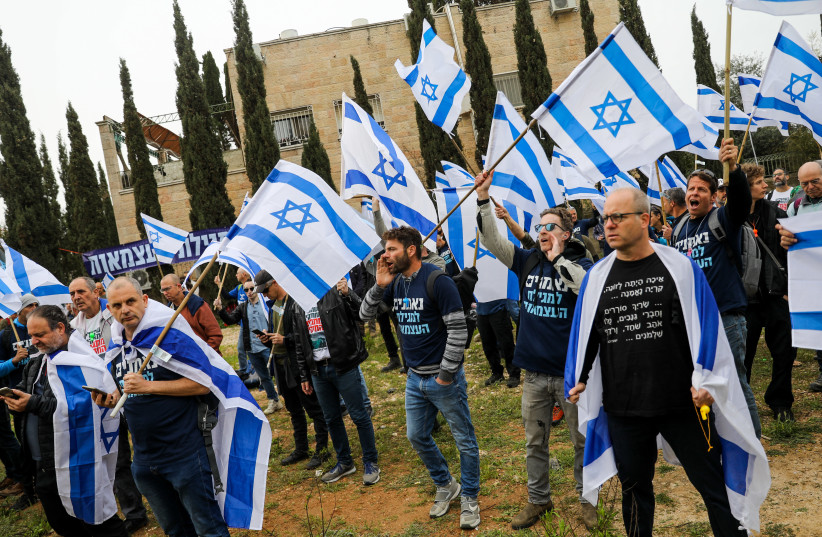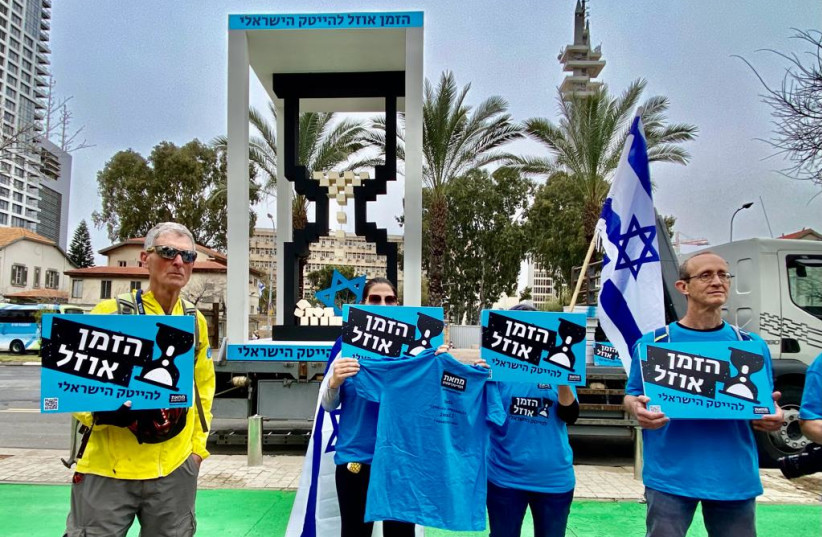Israelis of all ages and from a variety of sectors took to the streets on Thursday to protest against the judicial reform in a Day of Paralysis.
The morning began with a reservists' demonstration outside the homes of Shas leader Arye Deri and Education Minister Yoav Kisch on Thursday morning as the "Day of Paralysis" began.
At Kisch's home, four Air Force reservists were detained. One was later arrested, and the other three were released. The arrested man was released a couple of hours later.
The protestors at Deri's home said in a statement that people in the area had thrown eggs at them as they protested.
In the evening, hundreds of teachers and students protested in front of Economy Minister Nir Barkat's house in Jerusalem.
Dozens of people also held a protest against Transportation Minister Regev in front of a hotel in Hadera, where she stayed on Thursday evening.
Some dozen protestors demonstrated in front of a building in Petach Tikva where Finance Minister Smotrich and MK Simcha Rothman took part in a National Zionism party event. The protestors broke through fences and surrounded the building, according to N12.
Who is protesting where?
At Habima, children marched carrying a sign that read "you fell on the wrong generation."

A children's march was also held in Bitzaron.
Hundreds of protestors demonstrated at Airport City near Ben-Gurion Airport and blocked the roads in the area ahead of a conference scheduled to be held there in which Agriculture Minister Avi Dichter and Economy Minister Nir Barkat were meant to take part, according to N12.
When the ministers arrived, one protestor tried to hit Dichter with her flag, drawing criticism from the coalition MKs who condemned the violence.
The ministers said that they still intended to attend the conference, and after eggs were thrown at the protestors, they broke into the building.
University students protested outside of Tel Aviv University before setting out on a march toward King George Street.
In the afternoon, approximately 100 people who are related to fallen IDF soldiers protested outside the Kirya base, where the IDF chief of staff is headquartered in Tel Aviv.
"Every year, I go to the paratroopers' memorial in Gadera with my sons," said Ronen Leshem who lost his father. "Every year, and this year, we won't go. A group of corrupt people is tearing us apart stone after stone, and every citizen who loves the country has to protest to stop the reform."
Around 200 protestors demonstrated in the town of Karmiel in the evening. They gathered close to the Municipality building, dressed all in black and carrying signs saying "Don't throw away democracy."
Exhibitions of protest around the country
In Jerusalem, protestors hung a large Israeli flag and the Declaration of Independence from the walls of the Old City. The protestors carried signs that read, "loyal to the declaration of independence."
The Time is Running Out organization set up a giant hourglass in Tel Aviv. The hourglass signified that time is running out for the hi-tech sector in Israel.
We are protesting because we care about the country, and we care about hi-tech," said Yair Adato who is CEO of a startup company. "We are protesting because we want to stay in Israel, we love this country, and we're patriots, but we need the government to help us stay."
In the Green Village youth village, protestors set up an exhibit where three people wearing masks of Justice Minister Yariv Levin's, Prime Minister Benjamin Netanyahu's and Law Committee Chairman Simcha Rothman's faces held marionettes that were attached to people dressed as judges.

The exhibit's organizers said that "this is how Israel's judges will look the day after the overhaul. Politicians' puppets.
A sign bearing the words "we won't plan for a dictatorship" was hung on the Bezalel Architecture School building in Jerusalem.
"We are planning a better future, and we won't give a hand to dictatorship," said Hagar Liberzon from the Students' Protest. "Bezalel didn't open its doors this morning. The students and lecturers are going to the streets to fight for democracy."
Protestors block modes of travel
Ayalon Highway and Kaplan Street in Tel Aviv was blocked to traffic throughout the morning by Democratech, an organization of hi-tech workers protesting against the reform.
Traffic on Ayalon Highway remained blocked for over two hours until the police succeeded to clear the road, but shortly after, protestors attempted to block the highway again, according to KAN News.
Protestors also blocked Weizmann/Katznelson Interchange in Kfar Saba and Dvira Interchange on Highway 6 as well as other main roads Tel Aviv, Raanana and the south. In Tel Aviv and Haifa, police used water cannons to disperse the crowds.
Israel Police arrested two protestors at the Green Village Interchange on suspicion of disrupting public order. Another five were arrested at the Raanana Junction.
More than 1,000 people protested at Karkur intersection, according to Ynet News. After protestors blocked the intersection and stopped the traffic on Highway 65, the local police commander ordered his officers to clear the road.
Protestors also blocked Drorim junction on Highway 4 in both directions.
In total, at least 100 protestors were arrested throughout the day, most of them during the protests in Tel Aviv.
At the Ashdod Port, protestors from the Navy blocked the entrance to the port and burned tires in the area.
Israel Police arrived on the scene to direct traffic to alternative routes. They succeeded in clearing the way an hour later.
The police emphasized that they would "allow freedom of speech to every person, but disrupting the public order would not be allowed."
Concern about protests planned in Bnei Brak
Ahead of a demonstration planned in Bnei Brak for Thursday evening, public figures across the political spectrum called on both sides to show responsibility and restraint.
A call to residents of Bnei Brak was circulated on Wednesday on behalf of the Yeshiva Committee in Israel in the name of Rabbi Edelstein not to confront the protesters.
Prime Minister Netanyahu sent cabinet secretary Yossi Fuchs to tell Haredi party leaders, rabbis and thought leaders to try and calm the Haredi public and prevent clashes with the protestors.
President Isaac Herzog called for protestors to act responsibly and to avoid acts that would lead to more hate and the widening of rifts in the country.
Herzog emphasized that especially at the beginning of the holiday season there are opportunities to create respectful discourse and pay deeper attention to fears and concerns of the other side.
National Unity party chairman Benny Gantz joined the call to calm the spirits, saying "I call on the residents of Bnei Brak and the demonstrators who intend to come to the city today, to behave respectfully to each other, not to harm each other's way of life and to remember that in the end - we are all brothers, and it should remain that way."
The protest organizers explained the reasons for their protest in the Haredi city ahead of the demonstration, accusing Haredi politicians of being among the leaders of the 'coup.'
"It seems that after years of status quo, the ultra-orthodox leadership has declared war on us, the liberal public.
Therefore, tomorrow we will arrive en masse in Bnei Brak, the city where most of the ultra-Orthodox leadership lives, to tell them - that's it," they added.
Around 300 protestors began their march to Bnei Brak, starting from the Ramat Gan stadium parking lot. Hundreds of police officers were positioned along the expected route to prevent friction with local residents.
Protest organizers handed out helmets to the protestors, while some of the residents of Bnei Brak opened a stand offering refreshments to "our brothers from Tel Aviv," according to Walla!
Fireworks were launched on the protest march from a building facing the route of the march.
Around 10 p.m., the march ended and the police announced that streets that had been closed off, were opened for traffic again.
